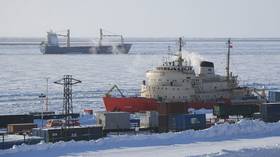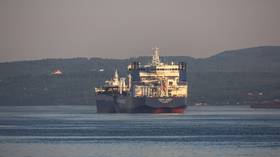Northern Sea Route now a major international shipping artery, minister tells RT

Aleksey Chekunkov, the minister for the development of the Far East and the Arctic, revealed to RT on Wednesday that despite sanctions affecting shipbuilding projects, the Northern Sea Route (NSR) in Russia's exclusive economic zone within Arctic waters is experiencing an unprecedented surge in development.
Chekunkov highlighted that freight turnover through this vital transport corridor skyrocketed to 34 million tons per year in 2022, marking an eightfold increase since 2015. Furthermore, he anticipates that ongoing infrastructure initiatives will propel this turnover to surpass 80 million tons by 2024.
“The Northern Sea Route has already become a full-fledged international artery; it can already be considered a global transportation corridor. A large part of the global economy depends on it; all the countries that receive our liquefied natural gas, including those that are currently deemed ‘unfriendly’… The intensity of shipping will increase many times over in the next seven years,” the minister stated, speaking on the sidelines of the Eastern Economic Forum in Vladivostok.
Chekunkov emphasized that the corridor should not be considered as Russia’s response to Western sanctions but is a global “route for transporting goods, which we are already producing or will soon start to produce.”
“The floating liquefaction plant, the Arctic LNG 2, will produce 10 million tons of LNG per year. To transport this gas through the ice, we need the Northern Sea Route; we need ice-class LNG carriers, ports, navigation, and control systems. The Vostok Oil project is being launched, coal and ore production projects continue to expand – all these ventures will produce 100 million tons by 2026 and 200 million tons per year by 2030-2031. That's what all this infrastructure we call the Northern Sea Route is for,” he explained.
Chekunkov noted that while Western sanctions were “a challenge” for the construction of ships that are set to operate the NSR, Russia has already managed to substitute most of the equipment and technologies it used to import from the West with domestic alternatives.
“We are overcoming this challenge. In April, we adopted an additional provision in our development plan for the NSR dedicated to creating domestic technologies for shipboard equipment. It envisages 18 billion rubles ($187 million) of budget investments in import substitution of these technologies. With regard to icebreakers, close to 100% of production is already localized,” the minister said.
Meanwhile, he noted that Russia has received multiple proposals from foreign partners to participate in its shipbuilding projects, most notably from India. Russia plans to build over 100 ice-class ships by 2030 and requires additional investments.
“India, as a major maritime and shipbuilding powerhouse, much like Russia, is keenly interested in cooperation with Russia in the north, in using the Northern Sea Route as an alternative transportation corridor, in mastering arctic navigation skills, participating in joint shipbuilding projects, and not only for cargo ships but also non-nuclear icebreakers,” the minister stated.
He stressed, however, that the “NSR infrastructure will still be of Russian origin, but technology and goods may be sourced from friendly states.”
For more stories on economy & finance visit RT's business section













